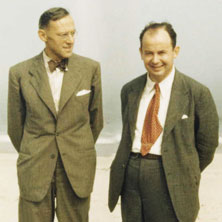


Oskar Morgenstern and John von Neumann at Spring Lake, ca. 1946.
Courtesy of the Institute for Advanced Study, Princeton
Courtesy of the Institute for Advanced Study, Princeton
GAMES, GROUPS, GOD(S) AND THE GLOBAL GOOD
 The symposium “Games, Groups, God(s) and the Global Good” explored the uses and limits of game theory in explaining ethical behavior and illuminating the nature and dynamics of moral order and even, perhaps, moral transformation. It took place in the fiftieth anniversary year of the death of John von Neumann whose groundbreaking 1928 paper, “Theory of Parlor Games,” proved the famous minimax theorem and whose later book (with Oskar Morgenstern), Theory of Games and Economic Behavior (1944), presented a groundbreaking mathematical theory of economic and social organization, based on a theory of games of strategy, that revolutionized economics and was soon used to analyze many real-world phenomena involving policy choices.
The symposium “Games, Groups, God(s) and the Global Good” explored the uses and limits of game theory in explaining ethical behavior and illuminating the nature and dynamics of moral order and even, perhaps, moral transformation. It took place in the fiftieth anniversary year of the death of John von Neumann whose groundbreaking 1928 paper, “Theory of Parlor Games,” proved the famous minimax theorem and whose later book (with Oskar Morgenstern), Theory of Games and Economic Behavior (1944), presented a groundbreaking mathematical theory of economic and social organization, based on a theory of games of strategy, that revolutionized economics and was soon used to analyze many real-world phenomena involving policy choices.
 “The meeting ‘Games, Groups, God(s), and the Global Good’ was highly successful, bringing together diverse individuals with diverse perspectives on the emergence and robustness of moral systems, and on game theoretical approaches to understanding these processes,” said Professor Simon Levin, the symposiums’s chair. “Inspired by the work of John von Neumann, this meeting involved game theorists, physical scientists and mathematicians, economists and sociologists, evolutionary biologists, ethicists, and theologians, and was characterized by remarkable cross-disciplinary dialogue. The reception that followed included John Nash and Thomas Schelling, who delivered a public lecture. A book based on the symposium is in preparation.”
“The meeting ‘Games, Groups, God(s), and the Global Good’ was highly successful, bringing together diverse individuals with diverse perspectives on the emergence and robustness of moral systems, and on game theoretical approaches to understanding these processes,” said Professor Simon Levin, the symposiums’s chair. “Inspired by the work of John von Neumann, this meeting involved game theorists, physical scientists and mathematicians, economists and sociologists, evolutionary biologists, ethicists, and theologians, and was characterized by remarkable cross-disciplinary dialogue. The reception that followed included John Nash and Thomas Schelling, who delivered a public lecture. A book based on the symposium is in preparation.”
“Games, Groups, God(s) and the Global Good” Symposium Participants
| Simon Asher Levin George M. Moffett Professor of Biology, Princeton University Kwame Anthony Appiah Laurence S. Rockefeller Professor of Philosophy, Princeton University Robert Axelrod Mary Ann and Charles R. Walgreen Professor for the Study of Human Understanding, University of Michigan Steven J. Brams Professor of Politics, New York University John E. Hare Noah Porter Professor of Philosophical Theology, Yale University Dominic D.P. Johnson Lecturer in Politics, University of Edinburgh |
Ehud Kalai James J. O’Connor Distinguished Professor of Decision and Game Sciences, Kellogg School of Management, Northwestern University Eric S. Maskin Albert O. Hirschman Professor of Social Science, Institute for Advanced Study, Princeton Martin A. Nowak Professor of Biology and Mathematics, Harvard University Barry O’Neill Professor of Political Science, UCLA Elinor Ostrom Arthur F. Bentley Professor of Political Science, Indiana University |
Thomas C. Schelling Lucius N. Littauer Professor of Political Economy Emeritus, Harvard University and Distinguished University Professor Emeritus, University of Maryland Karl Sigmund Professor of Mathematics, University of Vienna Brian Skyrms UCI Distinguished Professor of Social Science, Professor of Economics, and Professor of Logic and Philosophy of Science, University of California, Irvine Robert Sugden Professor of Economics, University of East Anglia |